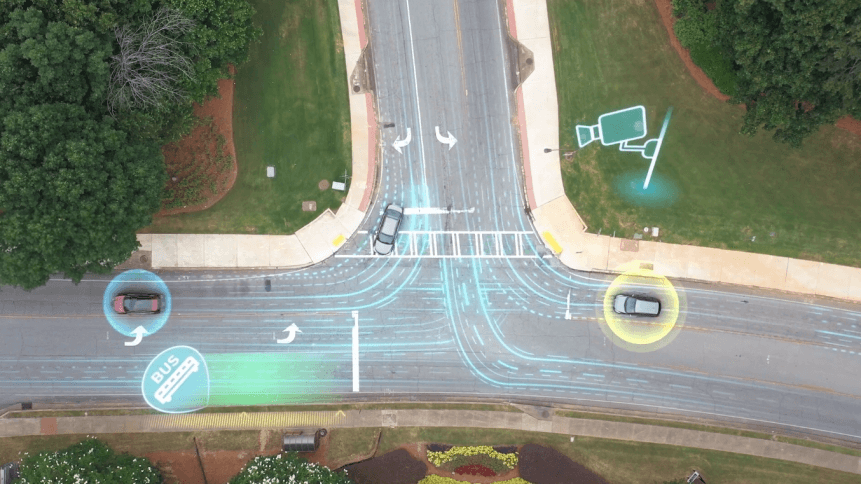First 5G-powered smart city ‘proving ground’ opens in US

Enhancing urban services such as energy, transportation, and utilities with ICT, the concept of the smart city— rooted in real, fast-emerging technology and 5G connectivity— is a tangible one.
At the same time, overhauling entire city blocks with IoT sensors and infrastructure is a monumentally ambitious and expensive vision.
While the potential for connected urban infrastructure is huge, it’s difficult to imagine self-driving cars and ‘connected’ street furniture arriving at scale within the next half-decade.
5G smart city proving ground
But the launch of Curiosity Labs at Peachtree Corners brings smart city visions a little closer. Based in the Georgian city of its namesake (Peachtree Corners), the initiative claims to be the nation’s first 5G-powered “proving ground” for smart city technology.
Launching tomorrow (September 11), the real-world test environment includes a 1.5-mile autonomous test track, office space for startups, operational 5G and 1G fiber, smart poles, DSRC units and video surveillance within the 500-acre technology park.
Curiosity Lab Overview from Tytan on Vimeo.
Jan Geldmacher, President of the business division of US cell carrier Sprint, which provides the park’s 5G and IoT infrastructure, said: “We are honored to work with the city of Peachtree Corners to help enable new technologies.
“From enabling the most accurate real-world navigation possible to delivering immediate intelligence from IoT connections, companies can now better test, and ultimately scale new solutions for the smart city landscapes of tomorrow.”
YOU MIGHT LIKE

How cloud computing will power smart cities
Commercial interests
Other partners of the Curiosity Lab include the Georgia Institute of Technology, whose researchers can benefit from the facilities, and Delta Airlines, which seeks to advance its autonomous vehicle and infrastructure research.
“Our 5G-enabled living laboratory will give Georgia Tech researchers the opportunity to push the frontier of emerging technology in a real-world setting that is almost impossible to replicate in a closed lab,” said Betsy Plattenburg, Executive Director of Curiosity Lab at Peachtree Corners.
Following the launch of the first “fully biometric terminal” in the United States, Delta’s Chief Operating Officer, Gil West, was upfront about the airline’s commercial interests in the testbed, which would allow it to “drive the leading edge of emerging technology” and “help shape how industry adopts it.”
“Autonomous vehicle technology is one of those innovations we see as having the potential to improve employee safety, the customer experience, and operational performance, and this partnership will help us explore all of those possibilities.”
via MikeQuindazzi: #DeepLearning and #LiDAR perception powering #AutonomousVehicles >>> nvidia via MikeQuindazzi >>> #AI #MachineLearning #IoT #ConnectedCars #Robotics #IIoT #4IR pic.twitter.com/cfKsTfPm4q
— Soumik Roy (@SoumikRoy) September 8, 2019
West added that this program is an important part of the global airline’s strategy to invest in solutions that empower customers and employees, reduce the stresses of travel and redefine flying over the next five years and decades to come.
For example, autonomous vehicles could help customers make tight connections across an airport, they could deliver delayed baggage to customers or transport aircraft parts to airports.
The launch of Curiosity Labs at Peachtree Corners follows the launch of the UK’s first 5G-enabled ‘test track’ for autonomous vehicles at the start of 2019, dubbed the Millbrook Proving Ground.
This test track was designed to support the validation and testing of level three to level five autonomous vehicles, which require high-speed testing and real-time connectivity to compare ‘real-world’ outcomes with decision-making simulations.









